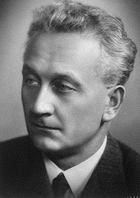Szent-Györgyi was an hungarian biochemist, famous by having isolated ascorbic acid (vitamin C) and for his discovery of the muscular proteins actine and miosine and several metabolic reactions of cellular breathing.
 Albert Szent-Györgyi was born on September 16th, 1893 in Budapest (then Austrohungarian empire). He studied medicine and had to fight during World War I, receiving a medal to the value. Later he continued studying and began to investigate in diverse European and American laboratories. In 1930 he returned to Hungary where he was an active anti Nazi militant. Year 1937 Szent-Györgyi received the Nobel prize of Medicine and Physiology. During World War II he was protected by the Swedish embassy, country that offered to him the citizenship. In 1947, having finished World War II, he emigrated to the United States of America by political reasons. There Szent-Györgyi was against the war of Vietnam and published "The crazy monkey", a critical commentary about the political leaders of the world and our possibilities of survival like species. Albert Szent-Györgyi was born on September 16th, 1893 in Budapest (then Austrohungarian empire). He studied medicine and had to fight during World War I, receiving a medal to the value. Later he continued studying and began to investigate in diverse European and American laboratories. In 1930 he returned to Hungary where he was an active anti Nazi militant. Year 1937 Szent-Györgyi received the Nobel prize of Medicine and Physiology. During World War II he was protected by the Swedish embassy, country that offered to him the citizenship. In 1947, having finished World War II, he emigrated to the United States of America by political reasons. There Szent-Györgyi was against the war of Vietnam and published "The crazy monkey", a critical commentary about the political leaders of the world and our possibilities of survival like species.
The main scientific contributions of Szent-Györgyi were:
- He isolated from the pepper ( Capsicum annuum ) a reducing substance that he characterized chemically and called ascorbic acid. He himself demonstrated that really it was the Vitamin C, discovered in 1907 by the Norwegians Axel Holst and Theodor Frölich.
- He studied the cellular breathing, observing the catalytic function that had fumaric acid and other dicarboxilic acids of four carbons. These studies were continued by Hans Krebs, that ended up describing the cycle of tricarboxilics acids.
- He discovered the two more important proteins of the muscle: actine and myosine. Also he demonstrated that the ATP (Adenosine triphosphate) is the primary source of energy in the muscular contraction.
- He studied the hormonal function of thymus.
Szent-Györgyi died in 1986.
More information:
|
 Albert Szent-Györgyi was born on September 16th, 1893 in Budapest (then Austrohungarian empire). He studied medicine and had to fight during World War I, receiving a medal to the value. Later he continued studying and began to investigate in diverse European and American laboratories. In 1930 he returned to Hungary where he was an active anti Nazi militant. Year 1937 Szent-Györgyi received the Nobel prize of Medicine and Physiology. During World War II he was protected by the Swedish embassy, country that offered to him the citizenship. In 1947, having finished World War II, he emigrated to the United States of America by political reasons. There Szent-Györgyi was against the war of Vietnam and published "The crazy monkey", a critical commentary about the political leaders of the world and our possibilities of survival like species.
Albert Szent-Györgyi was born on September 16th, 1893 in Budapest (then Austrohungarian empire). He studied medicine and had to fight during World War I, receiving a medal to the value. Later he continued studying and began to investigate in diverse European and American laboratories. In 1930 he returned to Hungary where he was an active anti Nazi militant. Year 1937 Szent-Györgyi received the Nobel prize of Medicine and Physiology. During World War II he was protected by the Swedish embassy, country that offered to him the citizenship. In 1947, having finished World War II, he emigrated to the United States of America by political reasons. There Szent-Györgyi was against the war of Vietnam and published "The crazy monkey", a critical commentary about the political leaders of the world and our possibilities of survival like species.